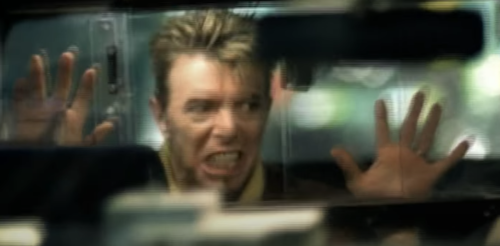So much of David Bowie’s music currently feels as though it was written by a prophet (along with Leonard Cohen’s, who also, appropriately, died in 2016). “Five Years” has been the song most bandied of late, from 1972’s The Rise and Fall of Ziggy Stardust and the Spiders from Mars. Warning the Earth of just five years left until its demise, Ziggy is there for the news report. Describing the reactions of those around him, Bowie sings, “We had five years left to cry in (cry in)/News guy wept and told us Earth was really dying (dying)/Cried so much his face was wet/Then I knew he was not lying (lying).” As the Earth barely manages to breathe these days, what with all the toxic air and so-called humanity swirling around within it, “five years” almost feels like a generous projection at times.
It is, however, 1997’s “I’m Afraid of Americans,” the final single from the Earthling album, that has the most resonance this particular birthday (and death) month of Bowie’s. You know, because of that botched insurrection attempt made by the Trump supporters who rose up from Middle-earth. Released at the height of the “electronica” sound that was making its way onto records like Madonna’s Ray of Light and The Prodigy’s The Fat of the Land, Bowie joined in with Brian Eno to create the music for this eerie and frenetic song, imbued with an even greater sense of paranoia thanks to a remix from Trent Reznor that helped propel the single up the charts slightly more than the ones that came before it.
Directed by dom&nic (then best known for their work with The Chemical Brothers), the video takes place in a version of New York City now entirely unknown to us, then still exuding some grit and a non-homogenous look. Opening in the Christopher Street area as Bowie picks up a paper with the headline, “Johnny’s An American” (a lyric in the song being “Johnny’s in America”), he feels the stalking presence of a stranger behind him (played by Trent Reznor himself).
Increasingly threatened by that hovering man, Bowie starts to run through the streets–with suddenly everyone around him appearing like some ghoulish phantom ready to pounce. To suck up some lingering remnant of a soul likely stamped out by being in America too long (and in New York in particular). It doesn’t assuage his worries that suddenly these strangers start to make the symbol of a gun with their hand, pantomiming the pulled trigger motion at their own heads (who are they, The Weeknd in “Save Your Tears”?). Panicked, he hops into a cab, thinking, like Kevin McCallister in Home Alone 2: Lost in New York, that he might actually be safe, only to find that the cab driver is the very man who has been pursuing him.
The pervading sentiment of detachment and isolation in a city filled with millions–and in a country filled with even more millions–reaches a zenith here. For anyone can do whatever they want to you in this “great land” seemingly without any consequence. Bowie bemoans, “No one needs anyone, they don’t even just pretend.” As he runs out of the taxi in fear of this man–this Johnny Everyman embodying all things that are terrifying about America and its denizens–he, too, gets out of the car. Only to shoot at it. Bowie ducks in terror (naturally), only to look up again and see that the man has briefly vanished. Now, a whole slew of “scaries” walking in a lynch mob permutation are approaching. The man has returned, this time carrying a cross over his shoulder like Jesus.
“God is an American,” Bowie repeats sardonically at the end of the song, reiterating this notion Americans–particularly the Bible-thumping ones–have of themselves as being superior in every way to other countries. That God “shed his grace” solely on them for the purposes of imposing their “culture” (utterly devoid of anything worthwhile for those seeking some form of intellectualism or self-actualization) everywhere else.
To this point, in an interview with Mojo when the song first came out, Bowie explained of the theme, “The face of America that we have to put up with is the McDonald’s/Disney/Coke face. This really homogenous, bland cultural invasion that sweeps over us–which is unfortunate, because the aspects of America that are really magical to us are the things it seems to reject, like black music [please excuse this non-PC turn of phrase] or the Beat poets.”
But there isn’t much magic to be found of late, with Bowie even then having to dig way back in time to find something meaningful in American art. That’s why he also paints the portrait of Johnny Everyman as follows: “Johnny looks up at the stars [there has to be some Oscar Wilde homage here, considering Bowie’s “UK-ness”]/Johnny combs his hair and Johnny wants pussy and cars.” The line could just as easily be replaced in the current landscape with, “Johnny wields his gun and Johnny wants Trump and farce.”
In a tragic twist of irony for Bowie, he ended up dying in America (because, try as New York might to deny it, it’s in America). The very place he had every right to fear, and warned us to as well.



















